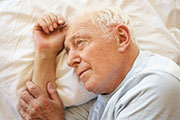- Could Your Grocery Store Meat Be Causing Recurring UTIs?
- Are You Making This Expensive Thermostat Error This Winter?
- Recognizing the Signs of Hypothyroidism
- 10 Strategies to Overcome Insomnia
- Could Artificial Sweeteners Be Aging the Brain Faster?
- Techniques for Soothing Your Nervous System
- Does the Water in Your House Smell Funny? Here’s Why
- Can a Daily Dose of Apple Cider Vinegar Actually Aid Weight Loss?
- 6 Health Beverages That Can Actually Spike Your Blood Sugar
- Treatment Options for Social Anxiety Disorder
Sleep Apnea Treatment Helps Seniors, Study Finds


A new study finds that continuous positive airway pressure (CPAP) is an effective treatment for seniors with sleep apnea.
CPAP is widely used to treat moderate to severe obstructive sleep apnea, a condition in which the airway relaxes and narrows during sleep, causing breathing problems and interrupted sleep that leads to daytime drowsiness.
CPAP keeps the airway open by pushing a stream of air through a patient’s nose via a mask that is worn during sleep. Previous research has shown that CPAP benefits middle-aged adults with sleep apnea, but there had been no studies on whether it was useful and cost-effective in seniors.
This new study of 278 sleep apnea patients aged 65 and older in the United Kingdom found that CPAP reduced their levels of daytime sleepiness and their health care costs.
“Sleep apnea can be hugely damaging to patients’ quality of life and increase their risk of road accidents, heart disease and other conditions. Lots of older people might benefit from this treatment,” study co-lead author Mary Morrell, a professor at the National Heart and Lung Institute at Imperial College London, said in a college news release.
“Many patients feel rejuvenated after using CPAP because they’re able to sleep much better, and it may even improve their brain function,” Morrell added.
“We think low oxygen levels at night [because of interrupted breathing] might accelerate cognitive [mental] decline in old people, and studies have found that sleep apnea causes changes in the gray matter in the brain. We’re currently researching whether treatment can prevent or reverse those changes,” she noted.
CPAP should be offered to seniors with sleep apnea, and more needs to be done to raise awareness of the condition, the study authors said. The study is published in the Aug. 27 online edition of The Lancet Respiratory Medicine.
More information
The U.S. National Heart, Lung, and Blood Institute has more about CPAP.
Source: HealthDay
Copyright © 2026 HealthDay. All rights reserved.










